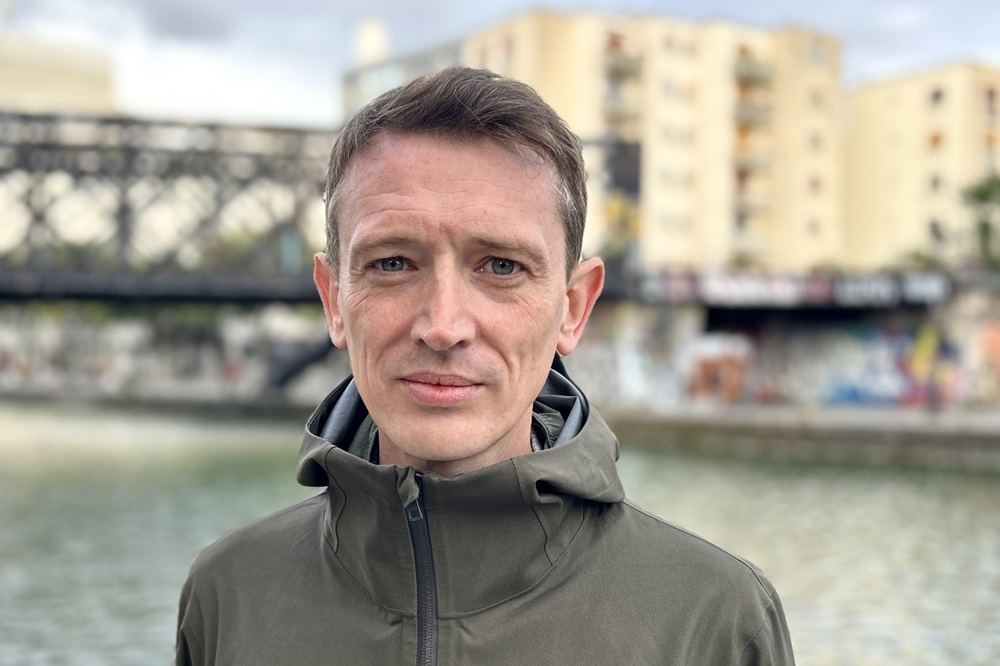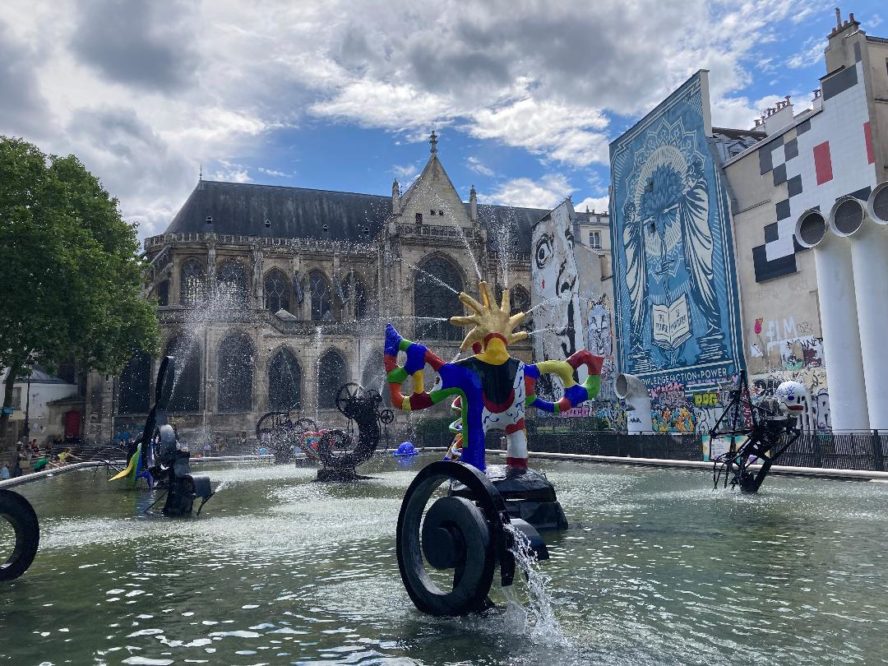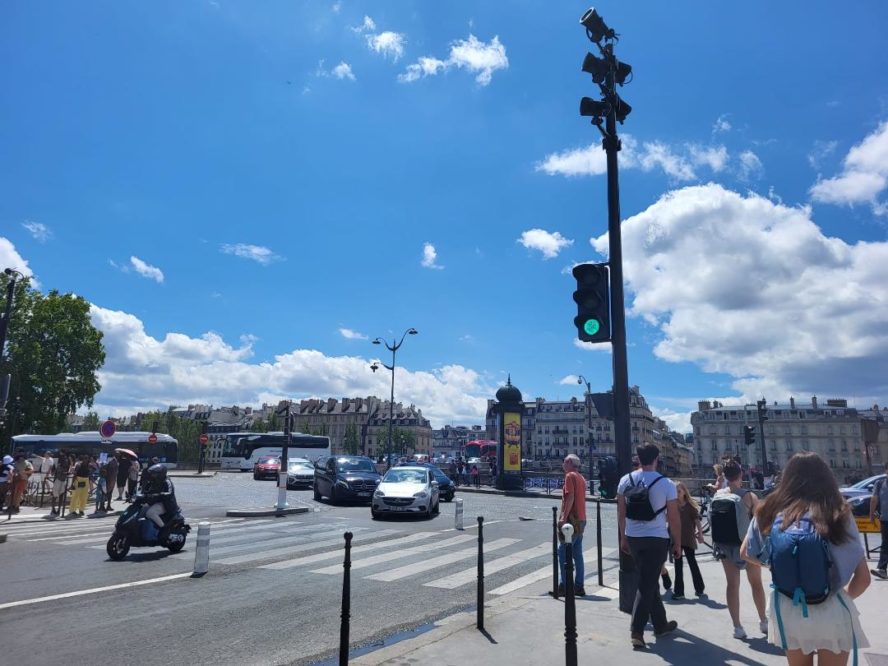Wales and the world: A Welshman in Paris

Jon Gower
The gifted Welsh novelist Owen Martell has been living in Paris since 2006, a time when he was curious to see whether he could learn another language.
‘I’d done some French in school and I had some French from my mother, who’d studied it at Aberystwyth, so I had a better chance of learning French than any other language, I think. I had enough money to pay for a month’s worth of lessons when I arrived and at the end of that month I found myself really struggling with the grammar, having got to what I thought would be my limit.’
We meet at a convivial café called Les Fontaines on Place Igor-Stravinsky, near the inside out architecture of the Pompidou Centre.
Working class
Owen himself lives away from the tourist enclaves of the city: ‘I don’t tend to come into the centre of the city all that often – I tend to stay in my neighbourhood, in the 19th arrondissement, an old working class area, where in the last election there wasn’t a second round run-off because the left was voted in with more than fifty per cent of the vote in the first round.

Ugliest
‘The main avenue, Avenue de Flandre, near the flat where I live, is probably the ugliest in Paris, with 1970s, brutalish tower blocks, which nevertheless have their own charm. It’s not a traditionally beautiful street but it’s managing to resist gentrification admirably, with halal and kosher butchers and working class cafes.
I keep on expecting there to be a new trendy cafe and there have been one or two but they never seem to stick.
‘The city of Paris is an artificially enclosed enclave really, and on the other side of the ring road, the périphérique, are the banlieues, the suburbs.
Some of those – the banlieues chics – are leafy, with detached houses and gardens, while others house the vast majority of people who travel into Paris every day to cook and clean and generally keep the place functioning on behalf of those who actually own it.

‘When sports commentators come to the Stade de France they always refer to “the gritty northern suburb of Saint-Denis”, as if they’d had personal experience of being mugged there.
They could be just as condescending, but in a nicer way maybe, if they referred to the place as “lively”, which it absolutely is.
There’s certainly more human – and humane – life there than in the areas around the Assemblée Nationale, for example.
Gritty
“That isn’t to say that it isn’t gritty either though. Near the gate into the city, where I live, just down the canal from the Stade de France, there’s been a big crack cocaine problem over recent years.
“A whole park will be given over to crack dealing and consuming for a while before everyone is moved on to some disused, in-between zone. There’ll be a mass movement every so often when groups of people in shocking, genuinely terrible states of suffering will be going en masse down one of the poorest avenues in Paris looking for help.
“You find yourself wishing they could be bussed into the ultra-wealthy 16th arrondissement, for example, at least for a while, where people’s spare change comes in note form.
“But people by and large are incredibly generous – people not rich themselves are expected to come to the aid of people in desperate need, and they do. When we’re told we live in a selfish society, it’s not true, or at least not in the way we’re meant to believe. People will give what they can and do what they can, because they recognise need.”
Jazz
While Martell’s most recent novel Intermission was about jazz, and the pianist Bill Evans in particular, politics is very much the subject of the book he’s currently writing. “It’s about the 1921 lock-out in the Rhondda. I’m writing it in Welsh because that was just as much the language of the lock-out as English. Meetings and gatherings and conversations on picket lines were taking place in Welsh.
“I imagine the conversations in the café where I tend to go in Paris – people use the cafes because their front rooms aren’t big enough to have friends round – being not entirely unlike the ones in the Rhondda as I imagine it in the 1920s: people coming together to discuss their lives and the world as they experience it, arguing, even agreeing sometimes, but talking it all out in the first place.
“Not enough people in Welsh-speaking Wales know just how much industrial relations were conducted in Welsh and that there are whole swathes of writings and magazines and journals in Welsh.”

It’s well nigh impossible to be in France at the moment without recognising that in the recent elections the country had a political close shave.
“Absolutely. Just after the UK voted for a Labour government, France surprisingly ended up with a left wing coalition taking the most seats.
“If France had the same political system as the UK then all the far right candidates would have been elected directly and they’d be in an absolute majority.
“Conversely, if the UK had second-round run-offs, like in France, Keir Starmer’s majority probably wouldn’t be anywhere near as big as it is.

“The issues are pretty similar for the UK and France. There’s a period of two or three years now where politicians have to make radical, tangible changes that will have material effects on people’s lives, or both countries will vote massively for extreme, far right parties next time.
“President Macron called a snap election and essentially his only argument was, “It’s me or chaos”. But he’s spent his seven years as president refusing to talk to even the moderate left wing, refusing to listen to legitimate, popular opposition to some of his policies, and bypassing parliament to push through deeply unpopular pension reforms and a right-wing-appeasing immigration bill.
“And it’s under him that the far right has gone from a handful of seats in parliament to 140-odd, of course. So in that sense, it’s already chaos – and that chaos is him.
“I think that this next period is incredibly important because if things don’t change materially, when it comes down to the defining choice between socialism and barbarism, many of the people who would always have been inclined to vote for the decent solution, socialism, will have become so disillusioned that they’ll think that barbarism is the only option. That is the massive issue facing France and the UK.”
Support our Nation today
For the price of a cup of coffee a month you can help us create an independent, not-for-profit, national news service for the people of Wales, by the people of Wales.






Diddorol iawn i ddarllen am Gymro arall sydd wedi ymgartrefi ym Mharis – fel y gnwes i yn y 1990’au am dipyn tros10 mlynedd. Diddorol iawn eto i ddarllen ei ddisgrifiad e o’r ddinas fel y mae hi heddiw ac am sefylfa wleidyddol Ffrainc ar hyn o bryd. Fel mae’n digwydd, bues i’n byw nepell o’i ‘Quartier’ e!